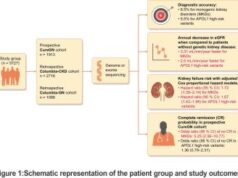Borno commissioner of health, Prof. Isa Marte Hussaini has declared that the state’s free dialysis initiative aimed at encouraging patients with a renal-related challenge to present early gulps of about N10m per month.
The professor of pharmacology also revealed that Borno currently has no radiotherapy centre.
According to him, while the initiative was a good development, it comes at a cost.
“Unlike in other states where people are forced to part with N50,000 to N100,000 for treatment, dialysis in Borno is free. The free dialysis treatment in Borno costs the government about N10m a month. That’s about N120m yearly,” he said.
He, however, told our correspondent that rather than abandon the initiative, the state government would go to any length to sustain it.
“You know kidney problem is very common in Borno state. We actually plan on having a massive enlightenment campaign because we have discovered that some patients have diabetes and some other hypertension. If these two diseases are not well taken care of, they may end up in kidney failure.
“We have to enlighten our people to get the right medications to take care of themselves and drink lots of water,” he stated.
Hussaini, a specialist in oncology treatment, has been involved in cancer researcher for decades.
In 2015, he presented one of his research findings to the Nigerian Academy of Science at the induction ceremony of Fellows in Abuja where he stated that some Nigerian herbal plants are more efficacious than the current drugs used in cancer treatments.
His appointment as a commissioner was announced on February 2, 2021, by the Special Adviser on Public Relations and Strategy, Malam Isa Gusau, following the termination of the appointment of the former health commissioner, Dr. Salisu Kwaya-bura.
Continuing, Hussaini disclosed that Borno State has only one dialysis centre which is located in a specialist hospital owned by the state government.
“There is also one that is run by the Federal Government at the University of Maiduguri Teaching Hospital. What this simply means is that we have two in Maiduguri for now.
“The state dialysis treatment is free while the one at UMTH charges patients for its service,” he said.
When asked what the queue usually looks like when patients troop out for dialysis treatment each day, the commissioner explained that patients take their time since the arrangements are done in an orderly fashion.
“Every day we get up to 15 or 20 patients showing up. If well regulated or organised, dialysis is not a problem. One can just show up, sit, get your dialysis done and walk out two or three hours later.
“We are going to see how best to improve the system. We have some nurses there who are really very good. They run the centre for 24 hours,” he enthused.
On radiotherapy, the Fellow of Nigeria Academy of Science decried that the state was yet to register its presence in such an area.
“We don’t have one at the moment. But I understand the UMTH has secured funding to build one especially for cancer and other treatments,” he said.











